08 Dec2020
By Nicole Dunn
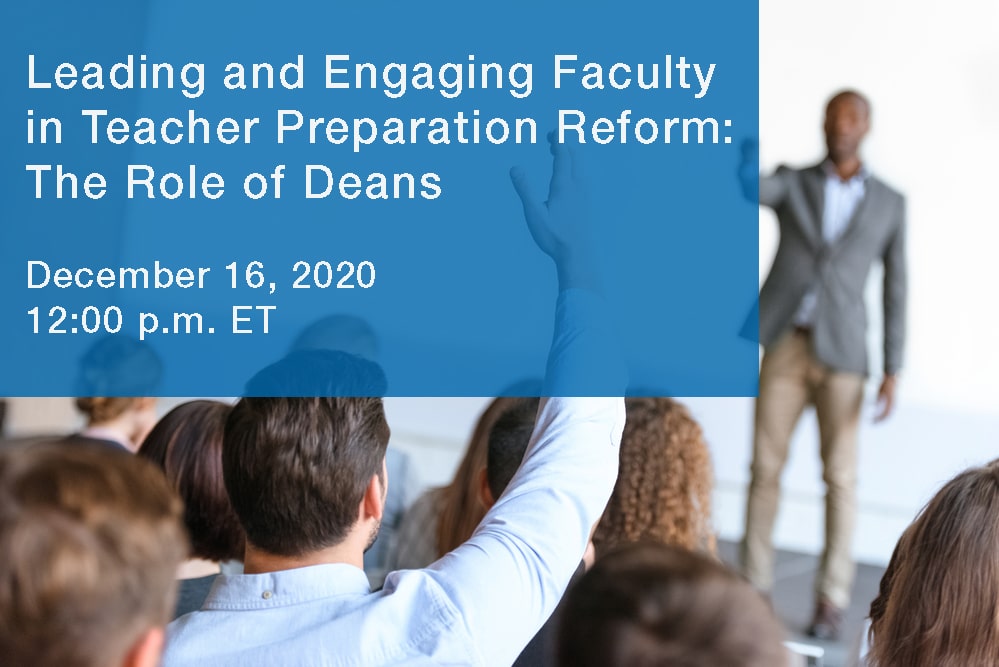
AACTE and CEEDAR (Collaboration for Effective Educator Development, Accountability, and Reform) Center are partnering together to present a webinar centered on a special issue brief, Leading and Engaging Faculty in Teacher Preparation Reform: The Role of Deans. The issue brief summarizes the experiences in leadership of six current and former deans who have been identified as engaging in successful collaborative reform efforts within their colleges.
During the one-hour event, Mary Brownwell will talk with Marquita Grenot-Scheyer and Kandi Hill-Clarke about the issue brief and their experiences of cultivating collaboration and supporting innovation among general and special education faculty who share responsibility to support students in diverse and inclusive classrooms. Since few resources exist to support deans in their efforts to work with faculty to engage in this work, AACTE and CEEDAR believe the experiences of these leaders will be useful to other deans as they work toward similar outcomes.
Register for the webinar, which will take place December 16 from 12:00 – 1:00 p.m. (ET). Learn more about the panelists:
08 Dec2020
By Katrina Norfleet
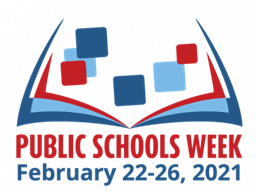 AACTE is joining its partner Learning First Alliance in celebrating Public Schools Week, February 22-26, 2021, to bring attention to the great accomplishments and great needs of public education. While schools are a place for nurture and learning, the global pandemic has created massive challenges for public schools. Still, public schools across the country have kept 50.7 million schoolchildren, 3.2 million teachers, and many other school staff and parents safe.
AACTE is joining its partner Learning First Alliance in celebrating Public Schools Week, February 22-26, 2021, to bring attention to the great accomplishments and great needs of public education. While schools are a place for nurture and learning, the global pandemic has created massive challenges for public schools. Still, public schools across the country have kept 50.7 million schoolchildren, 3.2 million teachers, and many other school staff and parents safe.
According to Learning First Alliance, public schools are emphasizing new goals this year:
- Keep children healthy by creating new educational practices, including cleaning, maintaining social distance, and screening those who need to be treated;
- Feed millions of students outside of school;
- Expand internet connectivity of students;
- Teach more effectively online by adapting existing curriculums; and,
- Increase awareness of racial justice and mental health and seek ways to connect to students who are grieving or traumatized.
08 Dec2020
By Katrina Norfleet
In partnership with Learning First Alliance, AACTE supports a letter sent to the Center for Disease Control (CDC) committee on vaccine priorities requesting that school personnel are a priority group once the administration of a COVID-19 vaccine begins. Below is a reprint from our partner organization, AASA: The School Superintendent Association, outlining the request.
LFA Board to CDC Committee on Vaccine Priorities
As part of our work with the Learning First Alliance, this week, AASA sent a letter to the Center for Disease Control (CDC) committee on vaccine priorities requesting that school personnel – including teachers, specialized instructional support personnel, aides, food service and custodial workers, and principals – are a priority group once the administration of a COVID-19 vaccine begins. Specifically, the letter highlights the profound impact of the COVID-19 pandemic on the economy and indicates that prioritizing school personnel for the initial distribution is critical for building public trust and reaching the vaccine target immunity goal.
The American Association of Colleges for Teacher Education, American Federation of Teachers, American School Counselor Association, Consortium for School Networking, Learning Forward, National Association of Elementary School Principals, National Association of Secondary School Principals, National Education Association, National PTA, National School Boards Association, and National School Public Relations Association joined AASA in this effort. If you want to check out the full letter, then click here!
30 Nov2020
By Amber Benedict, Linda Blanton, Mary T. Brownell and Jane E. West
 AACTE is proud to partner with the CEEDAR (Collaboration for Effective Educator Development, Accountability, and Reform) Center to bring you a webinar focused on a special issue brief, Leading and Engaging Faculty in Teacher Preparation Reform: The Role of Deans, on December 16, 12:00 – 1:00 p.m. ET.
AACTE is proud to partner with the CEEDAR (Collaboration for Effective Educator Development, Accountability, and Reform) Center to bring you a webinar focused on a special issue brief, Leading and Engaging Faculty in Teacher Preparation Reform: The Role of Deans, on December 16, 12:00 – 1:00 p.m. ET.
The issue brief summarizes the experiences in leadership of six current and former deans who have been identified as engaging in successful collaborative reform efforts within their colleges. AACTE and CEEDAR look to their experiences to support leaders, like you, in understanding the actions they took and the strategies they employed that may be useful to other leaders of educator preparation programs (EPPs) who are committed to restructuring curricula and programs in their own settings.
30 Nov2020
By Caitlin Wilson
 Mursion CEO Mark Atkinson hosted AACTE’s President and CEO Lynn M. Gangone for a virtual fireside chat in culmination of a multi-part series highlighting how Mursion’s virtual simulation classroom is being used in educator preparation programs. To start the conversation, Gangone reflected on how the pandemic has shaped the need to collaborate and to think differently on the delivery of instruction in the P-20 setting. She noted, “In our strategic planning process we created a vision to revolutionize education for all learners. We had no idea how prescient that was because of the pandemic.”
Mursion CEO Mark Atkinson hosted AACTE’s President and CEO Lynn M. Gangone for a virtual fireside chat in culmination of a multi-part series highlighting how Mursion’s virtual simulation classroom is being used in educator preparation programs. To start the conversation, Gangone reflected on how the pandemic has shaped the need to collaborate and to think differently on the delivery of instruction in the P-20 setting. She noted, “In our strategic planning process we created a vision to revolutionize education for all learners. We had no idea how prescient that was because of the pandemic.”
Rethinking clinical practice with the use of simulation is just one way in which innovation has supported the delivery of high-quality preparation without having to be on-the-ground. This helped accelerate AACTE’s collaboration with Mursion.
In addition to addressing the challenges and innovations brought on by the shift to virtual learning, Gangone and Atkinson also discussed efforts nationally to promote an antiracist agenda in schools to ensure the fair and equitable treatment of students. Gangone mentioned the importance of AACTE’s work in the area of diversity, equity, and inclusion. “We know that we all have implicit bias and that systemic racism exists,” she said. “So AACTE has been doing a lot of work in this area, from entrance exams into programs to other barriers to enter the profession.”
The discussion also focused on how simulation can support both teacher candidates and teacher preparation faculty in addressing their own inherent or implicit biases, which often carry into the classroom. “Simulation gives us an opportunity to deal with our own biases in ways that are really powerful and not bring harm,” commented Gangone. Engaging teacher education faculty in the simulation space could not only help to address biases and equity, but to better understand social and emotional learning, and effective pedagogy. There are a great number of possibilities when thinking through combining scholarship with simulation to move the field of education forward. Atkinson noted, “There is so much that we can bring to the floor, for teachers and leaders together, to really improve the way children experience school once they can get back into them again.”
Listen to the full recording of this conversation.
AACTE and Mursion are collaborating to support teacher preparation through the pandemic and beyond. Learn more details about this collaboration.
30 Nov2020
By Caitlin Wilson
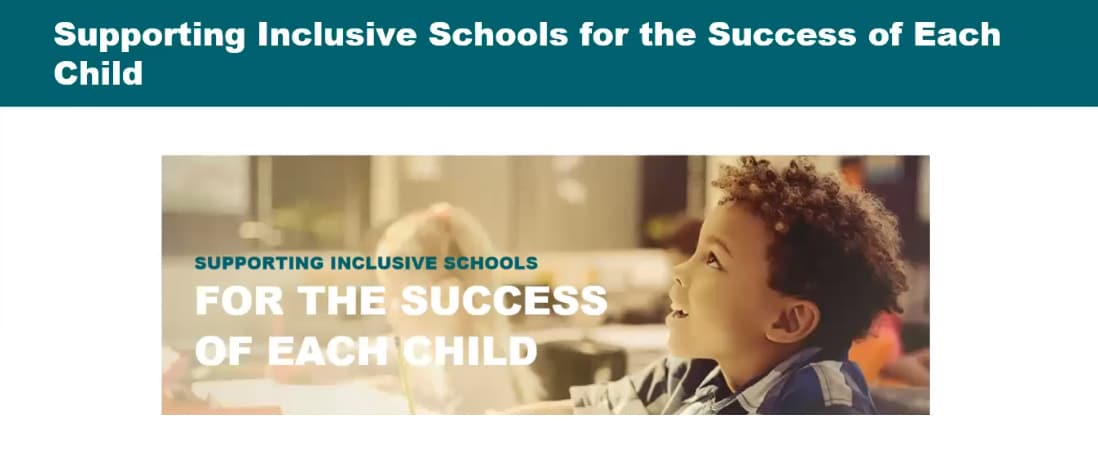 Last month, AACTE partnered with CCSSO, the Center on Great Teachers and Leaders at the American Institutes for Research, and the CEEDAR Center to discuss how teacher candidates can be leveraged as assets for PK-12 districts navigating online learning and uncertainty during the pandemic. During the webisode hosted by CCSSO, Loretta Mason-Williams from Binghamton University, Jacqueline Rodriguez from AACTE, and Christian Rodgers from AASA set the stage for how the needs of teacher candidates, schools, and families are changing in 2020. With this shift in needs comes opportunities for both schools and teacher candidates.
Last month, AACTE partnered with CCSSO, the Center on Great Teachers and Leaders at the American Institutes for Research, and the CEEDAR Center to discuss how teacher candidates can be leveraged as assets for PK-12 districts navigating online learning and uncertainty during the pandemic. During the webisode hosted by CCSSO, Loretta Mason-Williams from Binghamton University, Jacqueline Rodriguez from AACTE, and Christian Rodgers from AASA set the stage for how the needs of teacher candidates, schools, and families are changing in 2020. With this shift in needs comes opportunities for both schools and teacher candidates.
This webisode also featured faculty and staff from AACTE member institution, Boston University, and Boston public schools, along with Lindsey Decker, a current teacher candidate. Decker shared her experiences supporting her mentor teacher in an online environment and noted “teachers are looking for additional adults to be in the classrooms.” In the virtual environment, Decker said she works with learners in small breakout groups and “one-on-one to lessen the gap that we’re seeing from the pandemic.”
17 Nov2020
By Monika Jo
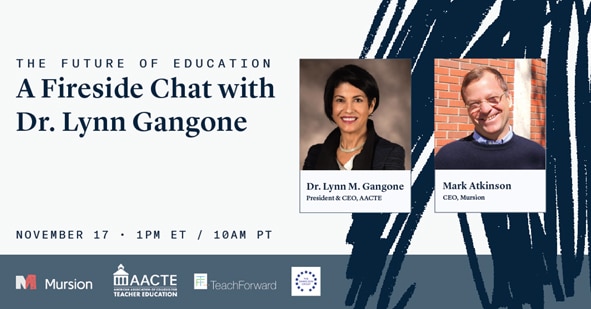 Please join us Tuesday, November 17, 1:00 p.m. ET for a joint reflection on 2020 and a look forward to the coming year. Mursion Co-founder and CEO, Mark Atkinson will host a fireside chat with AACTE President and CEO Lynn M. Gangone. Join the conversation as they share their perspectives on
Please join us Tuesday, November 17, 1:00 p.m. ET for a joint reflection on 2020 and a look forward to the coming year. Mursion Co-founder and CEO, Mark Atkinson will host a fireside chat with AACTE President and CEO Lynn M. Gangone. Join the conversation as they share their perspectives on
- The current state of teacher prep programs
- What will go back to “normal” vs. what innovations for coping with the pandemic will stay
- Models and systems are on the table for reinvention, writ large, what does this mean for higher education?
Register now for the free event.
The recorded session will be available for viewing.
16 Nov2020
By Matthew Wales

Applications are now being accepted for the new AACTE Video Observation Technology Implementation Grant. This opportunity, in collaboration with Edthena, is available exclusively to AACTE members.
Given the many challenges that educator preparation programs have weathered in 2020, AACTE and Edthena have created this grant opportunity to provide some much needed relief for up to 20 AACTE members. Each grantee will be awarded up to $25,000 in grant funds, which will be utilized to implement the Edthena platform for the upcoming Spring 2021 semester.
For those AACTE member institutions interested in applying:
- Active AACTE members in good standing, and not already an Edthena partner, are eligible for the grant.
- Matching of grant funds are not required during this Spring 2021 offering.
- Continuing Edthena implementation after the grant period is not required.
- Grantees will receive implementation and planning support from the Edthena team to build a deployment strategy for the spring semester.
- Awardees will receive access to the relevant edTPA toolsets needed for your program (where applicable).
- AACTE team members will also participate in onboarding training with grantees, where possible, to help connect awardees with additional resources.
09 Nov2020
By Jerrica Thurman

AACTE is collaborating with Edthena to provide $500,000 in grant funding to teacher education programs for Spring 2021.
AACTE member institutions may apply by December 7, 2020, to receive up to $25,000 for implementing video observation technology to support their teacher candidates during COVID-19 and beyond. Through this partnership, up to twenty AACTE members will receive grants for the upcoming Spring 2021 academic term.
A leader in video observation and collaboration technology, Edthena is widely used by schools, districts, and teacher education programs across the country. The technology platform enables teacher candidates to upload videos of their practice and faculty to provide feedback at specific moments in time. An approved edTPA platform provider, Edthena’s video technology can be utilized in methods courses, field observations, edTPA skill building, and group learning, making it possible to capture data for candidate growth and program improvement.
02 Nov2020
By Amber Benedict
 The CEEDAR Center is working on a collaborative effort to collect information from educator preparation programs across the country who are implementing effective, practice-based opportunities for teacher candidates within a virtual space. We’d like to invite you, your colleagues, and your partners (if applicable) to participate in a survey focused on online education for teachers of students with disabilities.
The CEEDAR Center is working on a collaborative effort to collect information from educator preparation programs across the country who are implementing effective, practice-based opportunities for teacher candidates within a virtual space. We’d like to invite you, your colleagues, and your partners (if applicable) to participate in a survey focused on online education for teachers of students with disabilities.
If you previously utilized an online teacher education program before COVID-19, and/or have adapted your program and/or clinical preparation model to accommodate a hybrid and/or online teacher education model during COVID-19, CEEDAR would love to hear from you. Please spend a few minutes completing this survey.
23 Oct2020
By Jacqueline Rodriguez
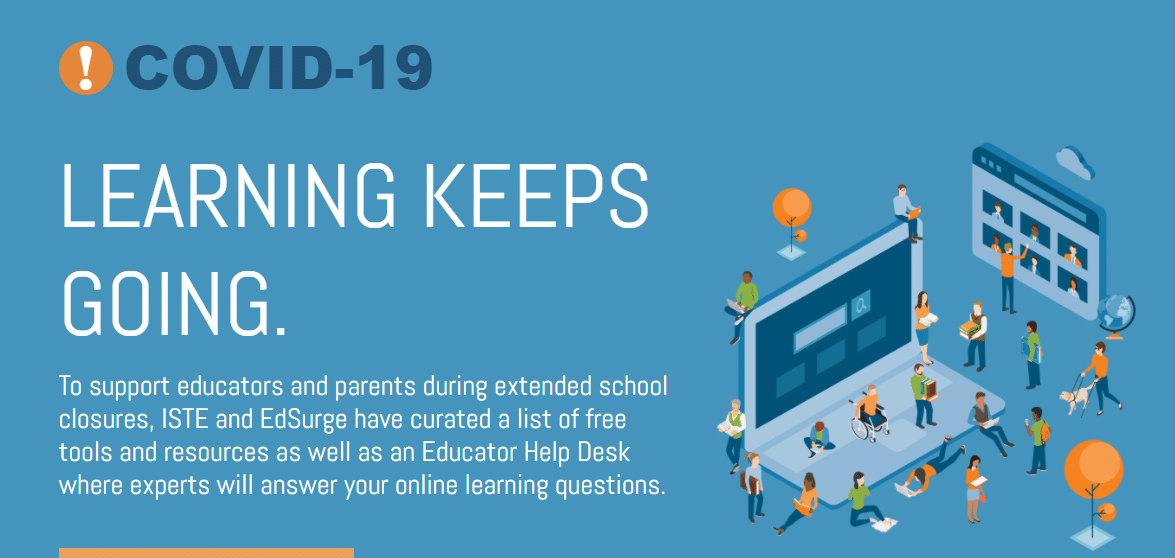 In early spring of 2020, AACTE joined ISTE’s LearningKeepsGoing Coalition. The Coalition subcommittees include Higher Education, of which I co-chair along with AACTE Innovation and Technology Committee Co-Chair David Slykhuis.
In early spring of 2020, AACTE joined ISTE’s LearningKeepsGoing Coalition. The Coalition subcommittees include Higher Education, of which I co-chair along with AACTE Innovation and Technology Committee Co-Chair David Slykhuis.
Each subcommittee developed resources that address the COVID19 pandemic in our nation’s public schools. The Coalition recently released two new resources for Institutions of Higher Education Educator Prep Programs and teacher candidates! The resources target different audiences. The student agency infographic is a resource for educator candidates and educator preparation faculty. As colleges and universities develop online course offerings, candidates are faced with learning how to access and benefit from online instruction. The infographic begins by amplifying five areas of student agency. Ten strategies guide students to advocate for online learning supports, use their own assets, and seek our mentors, to name a few. Students can also take an online learning readiness assessment to determine their preparedness for online instruction. Educator preparation faculty and staff are encouraged to disseminate this infographic to candidates who are learning online.
23 Oct2020
By Margaret Caspe
 Decades of research confirm the importance of families, schools, and community working together to launch students on successful trajectories. Yet, teachers attribute lack of preparation as one of their greatest barriers to building relationships with families and their greatest fear for failure. As a result, in January of 2020, the National Association for Family School and Community Engagement (NAFSCE) partnered with AACTE, CAEP, MAEC, the NEA, and selected faculty and state leaders to form the Pre-Service Family Engagement Consortium to enhance how educators are prepared to engage families and communities.
Decades of research confirm the importance of families, schools, and community working together to launch students on successful trajectories. Yet, teachers attribute lack of preparation as one of their greatest barriers to building relationships with families and their greatest fear for failure. As a result, in January of 2020, the National Association for Family School and Community Engagement (NAFSCE) partnered with AACTE, CAEP, MAEC, the NEA, and selected faculty and state leaders to form the Pre-Service Family Engagement Consortium to enhance how educators are prepared to engage families and communities.
20 Oct2020
By Nicole Dunn
AACTE invites you to participate in a webinar hosted by the Wallace Foundation and RAND to discuss insights from The Partnerships for Social Emotional Learning Initiative (PSELI).
PSELI is a comprehensive, multiyear initiative funded by The Wallace Foundation to explore whether and how students can benefit from intentional partnerships between schools and afterschool/out-of-school time programs focused on building social-emotional skills—and what it takes to do this work.
This free webinar, will share important insights from a new RAND report, Early Lessons From Schools and Out-of-School Time Programs Implementing Social and Emotional Learning, that examines 38 sites in six communities during the first two years of the PSELI initiative. AACTE encourages members not to miss this event at a time when interest in SEL is outstripping empirical guidance about how to implement these programs and practices.
Researchers from RAND will focus on topics such as developing adults’ capacity to promote SEL, improving climate and delivering SEL instruction to students, executing system-level activities to launch and coordinate SEL work across multiple sites, and developing partnerships between schools and afterschool/out-of-school time programs.
20 Oct2020
By Caitlin Wilson
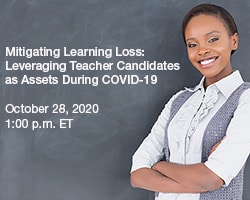 As students and teachers continue to navigate remote and hybrid learning environments, many are feeling overwhelmed. Parents and teachers are worried about the learning loss that has already and continues to occur during the pandemic. District staff are trying to address budget and service delivery uncertainty posed by the COVID-19 crisis. All of these factors may minimize important opportunities for collaboration between educator preparation programs and school districts. However, the repeated pandemic theme of getting through this together may be the key to addressing some of these challenges. Through collaboration with P-12 teachers, teacher candidates can assist in remote and hybrid learning in several ways to include co-teaching and one-on-one student support.
As students and teachers continue to navigate remote and hybrid learning environments, many are feeling overwhelmed. Parents and teachers are worried about the learning loss that has already and continues to occur during the pandemic. District staff are trying to address budget and service delivery uncertainty posed by the COVID-19 crisis. All of these factors may minimize important opportunities for collaboration between educator preparation programs and school districts. However, the repeated pandemic theme of getting through this together may be the key to addressing some of these challenges. Through collaboration with P-12 teachers, teacher candidates can assist in remote and hybrid learning in several ways to include co-teaching and one-on-one student support.
To discuss these opportunities for collaboration and to share examples of how teacher candidates are supporting teachers during this crisis, CCSSO is hosting a webisode on Mitigating Learning Loss: Leveraging Teacher Candidates as Assets During COVID-19. This webisode will feature key recommendations and discussion around the joint issue brief from CEEDAR, the Center for Great Teachers and Leaders at AIR, and AACTE released this summer: Addressing Shortages of Educators in an Uncertain COVID-19 Landscape: Viewing Teacher Candidates as Assets.
02 Oct2020
By Nicole Dunn
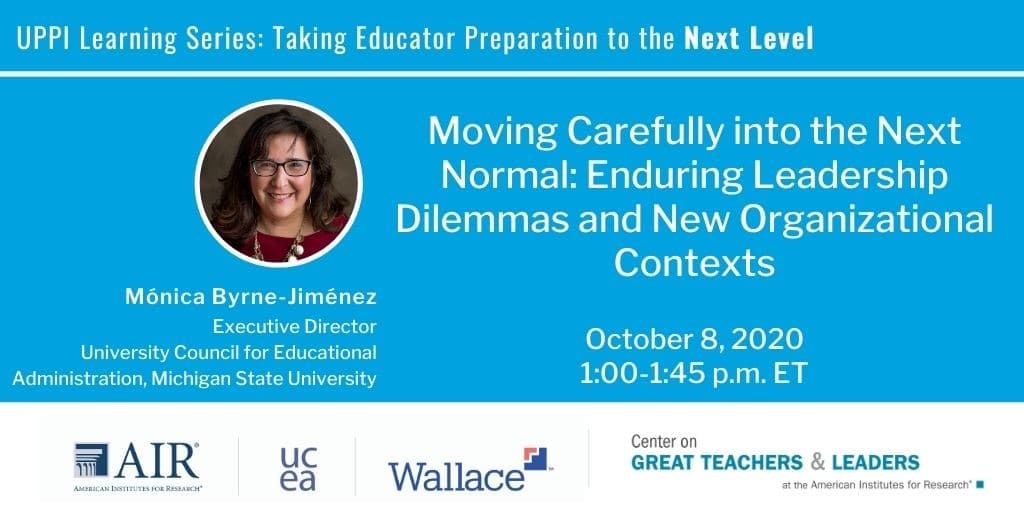
AACTE invites you to join the fifth and final session of The Wallace Foundation’s University Principal Preparation Initiative (UPPI) learning series. This session, Moving Carefully into the Next Normal: Enduring Leadership Dilemmas and New Organizational Contexts, will explore the question, “how can the teaching and learning faculty and education leadership faculty work together to prepare the next generation of school leaders?” Deans, department chairs, faculty, and district staff will receive a protocol designed to explore the assets of each department and how they can be combined to better prepare leaders.








 AACTE is joining its partner Learning First Alliance in celebrating Public Schools Week, February 22-26, 2021, to bring attention to the great accomplishments and great needs of public education. While schools are a place for nurture and learning, the global pandemic has created massive challenges for public schools. Still, public schools across the country have kept 50.7 million schoolchildren, 3.2 million teachers, and many other school staff and parents safe.
AACTE is joining its partner Learning First Alliance in celebrating Public Schools Week, February 22-26, 2021, to bring attention to the great accomplishments and great needs of public education. While schools are a place for nurture and learning, the global pandemic has created massive challenges for public schools. Still, public schools across the country have kept 50.7 million schoolchildren, 3.2 million teachers, and many other school staff and parents safe. AACTE is proud to partner with the CEEDAR (Collaboration for Effective Educator Development, Accountability, and Reform) Center to bring you a
AACTE is proud to partner with the CEEDAR (Collaboration for Effective Educator Development, Accountability, and Reform) Center to bring you a  Mursion CEO Mark Atkinson hosted AACTE’s President and CEO Lynn M. Gangone for a virtual fireside chat in culmination of a multi-part series highlighting how Mursion’s virtual simulation classroom is being used in educator preparation programs. To start the conversation, Gangone reflected on how the pandemic has shaped the need to collaborate and to think differently on the delivery of instruction in the P-20 setting. She noted, “In our strategic planning process we created a vision to revolutionize education for all learners. We had no idea how prescient that was because of the pandemic.”
Mursion CEO Mark Atkinson hosted AACTE’s President and CEO Lynn M. Gangone for a virtual fireside chat in culmination of a multi-part series highlighting how Mursion’s virtual simulation classroom is being used in educator preparation programs. To start the conversation, Gangone reflected on how the pandemic has shaped the need to collaborate and to think differently on the delivery of instruction in the P-20 setting. She noted, “In our strategic planning process we created a vision to revolutionize education for all learners. We had no idea how prescient that was because of the pandemic.” Last month, AACTE partnered with CCSSO, the Center on Great Teachers and Leaders at the American Institutes for Research, and the CEEDAR Center to discuss how teacher candidates can be leveraged as assets for PK-12 districts navigating online learning and uncertainty during the pandemic. During the webisode hosted by CCSSO, Loretta Mason-Williams from Binghamton University, Jacqueline Rodriguez from AACTE, and Christian Rodgers from AASA set the stage for how the needs of teacher candidates, schools, and families are changing in 2020. With this shift in needs comes opportunities for both schools and teacher candidates.
Last month, AACTE partnered with CCSSO, the Center on Great Teachers and Leaders at the American Institutes for Research, and the CEEDAR Center to discuss how teacher candidates can be leveraged as assets for PK-12 districts navigating online learning and uncertainty during the pandemic. During the webisode hosted by CCSSO, Loretta Mason-Williams from Binghamton University, Jacqueline Rodriguez from AACTE, and Christian Rodgers from AASA set the stage for how the needs of teacher candidates, schools, and families are changing in 2020. With this shift in needs comes opportunities for both schools and teacher candidates. Please join us Tuesday, November 17, 1:00 p.m. ET for a joint reflection on 2020 and a look forward to the coming year. Mursion Co-founder and CEO, Mark Atkinson will host a fireside chat with AACTE President and CEO Lynn M. Gangone. Join the conversation as they share their perspectives on
Please join us Tuesday, November 17, 1:00 p.m. ET for a joint reflection on 2020 and a look forward to the coming year. Mursion Co-founder and CEO, Mark Atkinson will host a fireside chat with AACTE President and CEO Lynn M. Gangone. Join the conversation as they share their perspectives on

 The CEEDAR Center is working on a collaborative effort to collect information from educator preparation programs across the country who are implementing effective, practice-based opportunities for teacher candidates within a virtual space. We’d like to invite you, your colleagues, and your partners (if applicable) to participate in a survey focused on online education for teachers of students with disabilities.
The CEEDAR Center is working on a collaborative effort to collect information from educator preparation programs across the country who are implementing effective, practice-based opportunities for teacher candidates within a virtual space. We’d like to invite you, your colleagues, and your partners (if applicable) to participate in a survey focused on online education for teachers of students with disabilities.  In early spring of 2020, AACTE joined ISTE’s
In early spring of 2020, AACTE joined ISTE’s  Decades of research confirm the importance of families, schools, and community working together to launch students on successful trajectories. Yet, teachers attribute lack of preparation as one of their greatest barriers to building relationships with families and their greatest fear for failure. As a result, in January of 2020, the National Association for Family School and Community Engagement (NAFSCE) partnered with AACTE, CAEP, MAEC, the NEA, and selected faculty and state leaders to form the
Decades of research confirm the importance of families, schools, and community working together to launch students on successful trajectories. Yet, teachers attribute lack of preparation as one of their greatest barriers to building relationships with families and their greatest fear for failure. As a result, in January of 2020, the National Association for Family School and Community Engagement (NAFSCE) partnered with AACTE, CAEP, MAEC, the NEA, and selected faculty and state leaders to form the  As students and teachers continue to navigate remote and hybrid learning environments, many are feeling overwhelmed. Parents and teachers are worried about the learning loss that has already and continues to occur during the pandemic. District staff are trying to address budget and service delivery uncertainty posed by the COVID-19 crisis. All of these factors may minimize important opportunities for collaboration between educator preparation programs and school districts. However, the repeated pandemic theme of getting through this together may be the key to addressing some of these challenges. Through collaboration with P-12 teachers, teacher candidates can assist in remote and hybrid learning in several ways to include co-teaching and one-on-one student support.
As students and teachers continue to navigate remote and hybrid learning environments, many are feeling overwhelmed. Parents and teachers are worried about the learning loss that has already and continues to occur during the pandemic. District staff are trying to address budget and service delivery uncertainty posed by the COVID-19 crisis. All of these factors may minimize important opportunities for collaboration between educator preparation programs and school districts. However, the repeated pandemic theme of getting through this together may be the key to addressing some of these challenges. Through collaboration with P-12 teachers, teacher candidates can assist in remote and hybrid learning in several ways to include co-teaching and one-on-one student support.